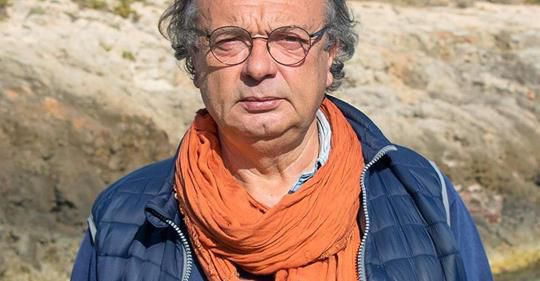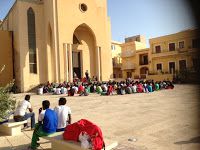Mincemeat
I was
sitting down with two workers from an Extraordinary Reception Centre*
in the province of Trapani, to discuss some of the problems which
noiselessly repeat themselves within the centres (and not only those
in Trapani), looking for some possible practical solutions. In these situations, the analysis often ends up being expressed in all its
rawness: “They’re mincemeat. It doesn’t matter if they’re adults or
children, men or women, most people don’t give them any attention,
starting with the institutions and ending with the stressed and
confused workers. And in these moments of stress, the migrant always
takes the blame, and pays for it. The workers are always more distant
from the needs of those who are being welcomed, because they’re not
paid, and they’re pressed from all sides by endless requests from the
migrants, who end up having mincemeat made of them, without any
possibility of getting out unharmed.”
Similar
situations, all too analogous, are showing a deterioration in a
system which had already fundamentally failed. For this reason, the
presence of some good workers and the few good practices are coming
to an end, because the foundation has no solidity, because the system
is adjusted to our needs (earnings, jobs, welfare) and not to those
of the migrants themselves (reception, interaction, opportunity).
In order
to describe the atmosphere we are feeling and living through, we can
turn to some words from our friend Francesco, attached to the
“Mediterranean Hope” project on Lampedusa: “This Summer we’ve
seen two lines converge: the migrants bathing at the beach with the
tourists, without any damage to the local economy, despite the fears
of some about what would happen. We’ve seen them walking along a Via
Roma full of people, chatting with tourists seated on the benches,
discussing European football with them. Until some weeks ago, the
tourist season marked a record presence on the island, and coincided
with a general tolerance towards the migrants, at least those who
could leave the Hotspot. Many of these young people have come to our
office to call home and connect to the internet, hanging around in
the park next to our building without causing any kind of problem. In
these past months, we have seen that those coming via sea to search
for a better life do not damage tourism. We have had an opportunity
to understand that for these young people, it is not easy to live
inside a Hotspot such as the one on Lampedusa, and quite likely it
wouldn’t be for anyone. Recently we haven’t seen them walking through
the town any more, without understanding the reason fully, but we
know that they are there, waiting to undertake an even more
precarious journey.”
Many
people on Lampedusa are under the impression that people no longer go
out because the transferrals are more regular and rapid than ever
before. The case is that since August 31st,
when 1,200 migrants were landed on the island, the centre completely
broke down – partly because the Hotspot’s two pavilions, including
the one for minors, which went up in flamesat the end of August, are still uninhabitable – and the transferral
were made not only with the ferry line but also by hovercraft, and
will have been intensified in the past few days with the imminent
arrival of October 3rd.
The day marks the National Day in Memory of the Victims of Immigration, and with the spotlights focussed on the island,
everything has to be spick and span. But this is not the only reason.
In the next few days the guests will arrive for the “Prix Italia”
(the longest standing Radio and Television award in Italy, organised
by RAI), with their own TV crews, politicians, red carpets and no
doubt a handful of migrants will be shown on TV too, to tell the
world how great we all are.
The
island’s Hotspot currently houses around 200 people, including many
minors (both male and female), who live without any appropriate
separations. Among them there are 48 Eritreans who arrived last
Sunday, truly in a terrible condition regarding both their physical
and mental health, likely due to the ever more traumatic conditions
in which they are forced to live in Libya prior to their departure
for Italy. The average waiting time within the centre at Lampedusa
now seems to have been reduced, but currently there are still people
within the hotspot who have been illegitimately detained for around a
month.
As
Antoine-Laurent de Lavoisier teaches us, nothing
is lost, nothing is created:
the continual arrival of the hovercrafts and ferries from Lampedusa
can only mean the overwhelming of the Hub at Villa Sikania, which is
periodically emptied out thanks to autonomous departure of many of
the migrants housed there. And those who leave are above all the
Eritreans – who can then be seen on the long march along the
motorway which leads to Agrigento – their trust and courage broken
by the extremely long waiting times for the conclusion of a
relocation process which has never worked: people spend even more
than 9 months in an extended limbo.
This meat factory of a reception system becomes even worse in
relation to families, couples, who manage to cross the desert, Libya
and the sea unharmed, but are then divided up on arrival at the
Sicilian ports through administrative errors on behalf of the
Prefecture and police, and then the waiting time becomes heavier
still, frequently intolerable. Last week a young Eritrean mother
demonstrated her worsening state by cutting herself, because she had
spent so long waiting to be reunited with her husband.
The system does not spare minors either, as has been denounced so
many times. The limbo becomes hell when they turn 18, and have to
begin all over again in an Extraordinary Reception Centre*, where the
atmosphere is always more hostile, and thus many leave, looking for
opportunities, and often without any destination. There is no immune
system here against inefficiency and break down: the latest emergency
relates to the 18-year-olds still in hostels for minors. Around 20%
of them are in ‘first’ reception structures, in community hostels or
other emergency centres, where minors and 18-year-olds are forced to
live in a situation frequently characterised by high tensions,
because while the minors are dealt with by local councils, the
18-year-olds – who in theory and by law ought to be transferred,
but due to a lack of places remain for long periods in the centres
for minors – are dealt with in a different way by the Prefecture,
even if they are all in the same centre or community. Situations like
this generate conflict between the residents, as well as between them
and the workers, conflicts which generate further misunderstandings
at best, and protests and violent fights the rest of the time. The
final stage in these recent acts of injustice is the escape. Two
Sundays ago we met 4 young Eritrean women on the motorway between
Palermo and Trapani, seemingly wandering aimlessly, who we flagged up
to the police as well as the communities in the nearby area, asking
if they had “lost” some minors, hearing back in many cases the
words “but what can we do about it.”
Unfortunately migrants are ever more at risk of becoming the “reason
for all our problems”, exposed to a national politics of exclusion
and exploitation, exactly as reflected by the words heard in a bar in
Trapani: they are simply mincemeat.
Alberto
Biondo
Borderline
Sicilia
Project
“OpenEurope” – Oxfam Italia, Diaconia Valdese, Borderline
Sicilia Onlus
*Extraordinary
Reception Centre = Centro di Accoglienza Straordinaria (CAS)
Translation:
Richard Braude


